
Releasing your music to the world is an exciting and nerve-wracking experience for any musician. Choosing from numerous platforms can be overwhelming. You might wonder where to start.
Ready to master the art of music distribution so you can navigate the various platforms and release your music confidently every single time?
I have released music on all platforms as Best Friends Club for 3+ years (by myself and with record labels!). In this guide, I will share all the tips I’ve learned.🙂
What Is Music Distribution?
Music distribution is the process of getting music from an artist or record label to the public, usually by making it available on streaming services & digital music stores.
Music distribution companies partner with platforms like Spotify, Apple Music, and Amazon Music to ensure that music reaches a wide audience globally.
Digital distribution lets artists make money and gain exposure without traditional physical barriers.
How To Release Music Online With Music Distribution Services

To release music online so your songs can be heard on streaming services everywhere, all you need is:
- A music distribution account
- Your audio (WAV format)
- Your artwork (3000px by 3000px, JPEG format)
- Meta-data (ie: song name, artist name, etc)
Additionally, having a comprehensive strategy that includes social media and digital advertising is best if you want to maximize the number of streams your music gets.
For a simple 5-step plan for releasing music properly, check out this article on How To Release Music Online.
How To Pick A Music Distributor For Your Music
When choosing the best music distribution company, there are really only 2 things that matter:
- Having the ability to release unlimited songs
- Not having to pay a percentage of your music’s income
By consistently releasing new music, you have more opportunities to pitch to the Spotify editors, have your song saved by listeners, and have more chances to influence the Spotify algorithm.
This is why being able to release unlimited songs for a small annual fee is so important.
Also – when your music finally starts to build momentum, or even pop off, you’ll want to make sure you see as much, if not all, of that money.
So make sure to choose a company that does not take a cut of your music’s revenue and Spotify royalties.
Spotify’s Preferred Music Distributors
When choosing a music distributor for your music, it’s good to know that Spotify has actually made a list of music distributors that they prefer and recommend.
The top 3 Spotify-recommended artist distributors are:
- DistroKid
- CD Baby
- EmuBands
These music distributors handle the legal work, royalty payments, and Spotify For Artists verification and access in addition to distributing your music to Spotify and other services.
To learn more about Spotify’s “Provider Directory” with the full list of preferred distributors, read this article on Spotify’s Preferred Music Distributors.
Can You Upload Directly To Spotify?
You might wonder if you need a music distributor or if you can upload directly to Spotify.
It is not currently possible to upload music directly to Spotify because they had difficulty monitoring the rights associated with music distribution on their own.
Instead, you need to sign up with one of Spotify’s preferred music distributors and submit your music, artwork, and artist information through that distributor.
To learn more about Spotify’s history with direct uploads, read this article called Solved: Can you Upload Directly To Spotify?
What Are The Best Music Distribution Services?
Here is a list of the best music distribution services for artists, musicians, bands, and even record labels for getting music properly released to streaming services and online stores.
1. DistroKid – Best Overall Music Distributor
DistroKid is my personal music distributor of choice, I’ve been using them for over 3 years now and have released over 40 songs with them so far.
The main benefit of using DistroKid is that you get fast and unlimited song uploads for a small annual fee, without DistroKid taking a cut of your revenue.
With that said, you should know that do need to keep paying the small annual fee to guarantee your music stays up and that DistroKid does try to upsell you on different upgrades called “goodies” (all of which I personally ignore every time).
| Pros | Cons |
|---|---|
| Unlimited song uploads (you don’t have to pay per song or album!) | You need to upgrade to the Musician Plus plan to set custom release dates |
| Widely available DistroKid discount to save on your first year | No DistroKid app available (yet) |
| Simple, low-cost annual fee | Have to keep paying the annual fee to keep your music up |
| You keep 100% of your Spotify royalties, Apple Music royalties, etc | The dashboard and stats area’s design is not appealing |
| DistroKid is one of the fastest music distributors | They pay out randomly every 2 to 3 months, not on a consistent schedule |
| They are constantly adding new features and new stores | Poor customer support |
| DistroKid has built up a great reputation over the years and they have a great relationship with its users |
To learn more about DistroKid, check out my full DistroKid Review. 🙂
2. TuneCore Unlimited – Best Traditional Music Distributor
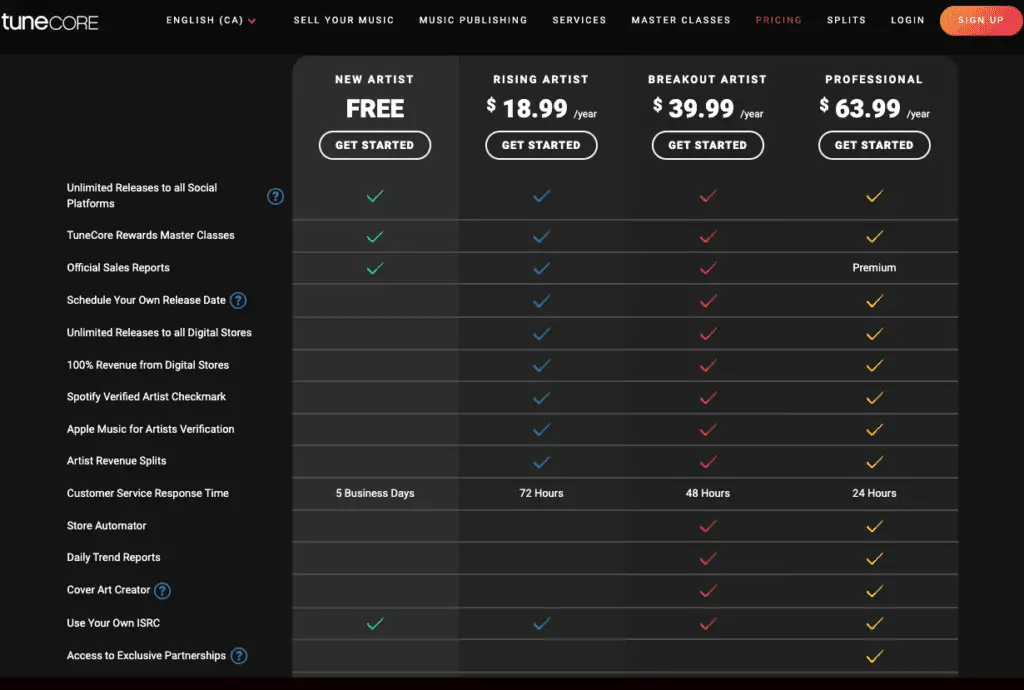
In the past I couldn’t recommend TuneCore to anyone, however, in June 2022 they updated their pricing to be more in line with modern music distribution companies by offering unlimited song uploads for an annual fee without taking a cut of your revenue.
The pricing for their best plan is a great value and TuneCore is a super reputable company that has been in the music distribution space pretty much ever since streaming services became a thing.
With that said, not all of TuneCore’s plans offer the best value, so I would highly recommend TuneCore’s ‘Rising Artist’ plan if you are considering signing up with them.
To learn more about TuneCore’s new plans, check out my full article on Tunecore Pricing (particularly since there are several plans that I would recommend avoiding there).
3. Symphonic Distribution – Best Music Distributor For Electronic Artists
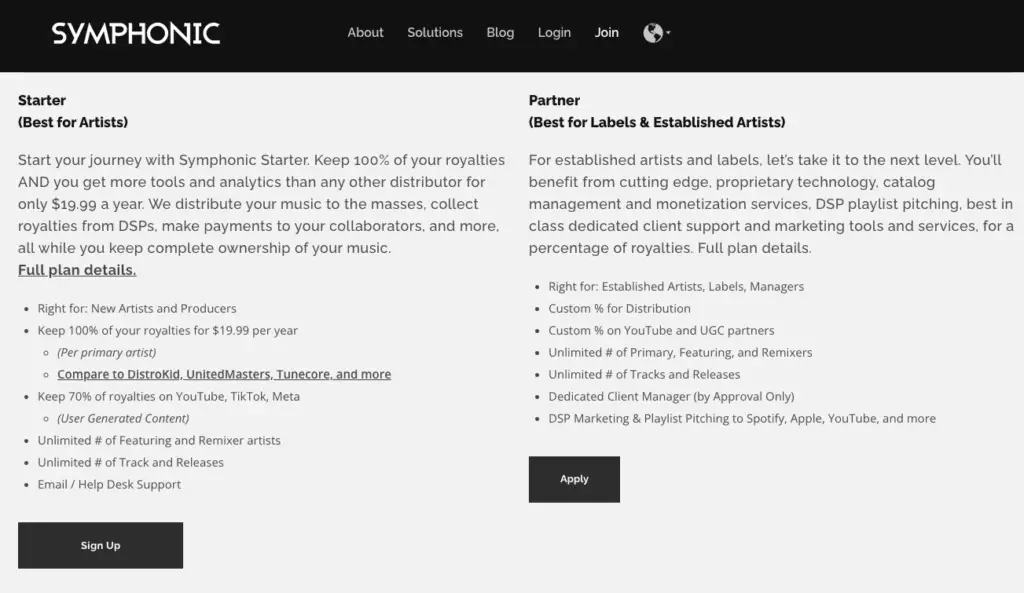
Symphonic Distribution is a good distributor because they offer fast unlimited uploads for a fair price without taking a percentage of your earnings.
They are even on Spotify’s preferred partner list and they include many features that other distributors charge you extra for.
| Pros | Cons |
|---|---|
| Unlimited releases for a low annual fee | An overwhelming number of options, solutions, and services are available to artists (some self-serve and some are through a deeper partnership) |
| Artists get to keep 100% of their royalties & rights | Some features/services appear to be simple links to other services without any deeper integration (or at least discount) |
| Get your music on Spotify in 1 – 2 days | Symphonic is a new player in the “self-service music distribution” space |
| Free royalty splits with other artists or collaborators | |
| Release dates are built into the price (not an upsell) | |
| Proper distribution to Beatport (no upsell & choose your own label name) | |
| Has worked with lots of reputable artists | |
| Lots of other non-distribution services available for when your music career grows to need it |
To learn more about the pros and cons of using Symphonic, how their pricing works, and how they compare to the most popular distributor, check out my full Symphonic Distribution review.
4. Amuse
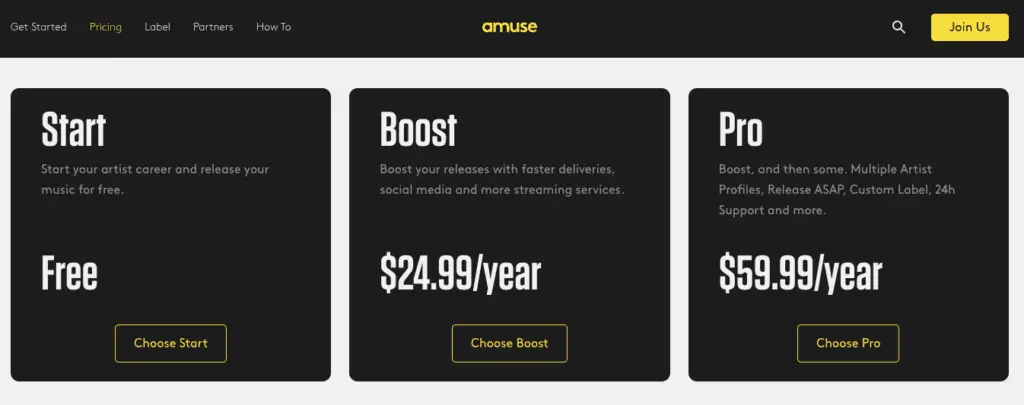
What makes Amuse a great music distributor is due to the fact that they are one of the few distributors that offer a free plan without taking away a single percentage of your streaming royalties.
If you’re just getting started with releasing music and what to start slow to test out the waters, Amuse easily has the best free offer on the market today.
Getting your music on streaming services through Amuse can be slow. You’ll need a solid release strategy and careful planning.
With that said, Amuse ultimately set itself apart by offering a truly free music distribution system and providing a powerful mobile app that users can use to upload music and check their stats.
To learn more about Amuse, check out my article where I compare DistroKid vs Amuse. 🙂
5. Ditto
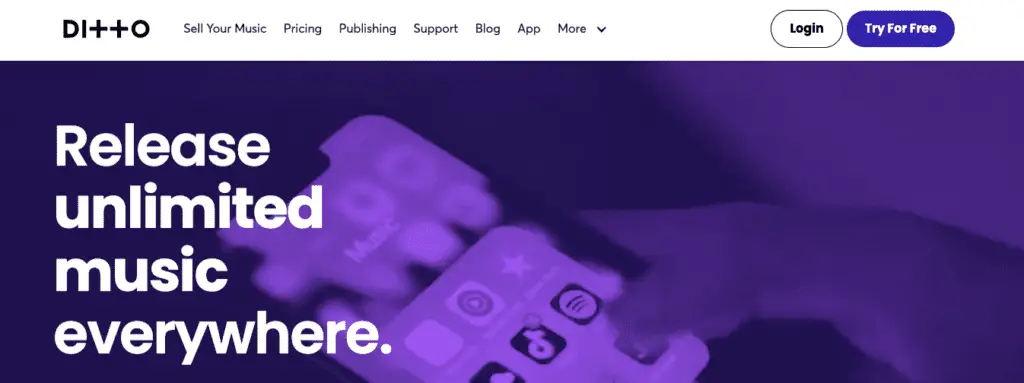
When directly comparing the features that Ditto offers against what DistroKid offers, I think Ditto absolutely smashes it out of the park here.
A lot of the features like custom release dates, Shazam, and YouTube Content ID are built into the base price of their cheapest plan where DistroKid makes you upgrade and upsell these exact same features.
These are some insanely massive benefits in my eyes, however, in my research, I’ve found out that they seem to have a bad reputation in the music industry as well as less than stellar customer service.
| Pros | Cons |
|---|---|
| Keep 100% of the revenue your music generates (even on the free plan!) | Super slow: 3 to 4 weeks on free plan and 2 weeks on the pro plan |
| The awesome Amuse mobile app | Distribution to social media platforms is locked behind the pro plan |
| Easily the best free music distribution offer on the market today | Charged a fee for royalty splits on the free plan |
| The main benefits are the free plan and the mobile app | The high price tag of the pro plan |
| Only upload 1 release at a time on the free plan | |
| Can’t set a specific release date on the free plan |
To learn more about Ditto and what I learned about them, check out this article where I compare DistroKid vs Ditto. 🙂
6. Landr
Landr is an online music software that allows you to get your music mastered online. In addition to this service, they also offer rent-to-own audio plugins, sample packs, collaboration tools, and digital music distribution.
If you are already a Landr customer then doing your music distribution is a no-brainer since you can save money with their “All Access Pass” ($149.99 per year) and not have to jump around between services to do your music work.
With that said, Landr’s music distribution offering seems to be more of a “value add” than a “core feature” as it seems to be a way to upsell its current customer to make more money or to be seen as a “one-stop-shop” for newer customers.
In addition to this, a big disadvantage of using Landr is that they can take anywhere between 9% to 15% of your income and make you pay a setup fee per song or album depending on which plan you choose with them.
| Pros | Cons |
|---|---|
| After paying once, your music stays live on streaming services and stores forever | Landr can take between 9% – 15% of any income your music generates depending on the plan |
| Landr has some additional services that you can pay for including mastering and a sample library | You have to pay a setup fee per song or album on the ‘free’ and most affordable plans |
| The main benefits are that your music stays up forever after paying and they have other features you can pay for | Music distribution is not the company’s core business, focus may be on upselling other services |
To learn even more about them, check out my article where I compare DistroKid Vs Landr. 🙂
7. CdBaby
CD Baby is a music distributor that uploads your music, album art, and metadata to streaming services and stores like Spotify, Apple Music, Amazon Music, Pandora Radio, and 150+ other streaming services.
I’m not too crazy about CD Baby since they are still pushing a “pay-per-release” music distribution model which is out of date and isn’t useful for most musicians, artists, and record labels in 2022.
With that said, they may be one of the oldest music distribution companies around so you know that they are reputable, trustworthy, and provide great service – many people swear by them and continue to use them to this day.
Hopefully, they will update their pricing model and plans like TuneCore recently did, but until then, they are going to end up quite low on this list.
| Pros | Cons |
|---|---|
| After paying once, your music stays live on streaming services and stores forever | CD Baby takes 9% of any income your music generates |
| There is no annual fee that you need to pay | You have to pay a setup fee per song or album |
| CD Baby is able to take care of music publishing for you (for an additional fee, but still) |
To learn even more about them, check out this article where I compare DistroKid vs CD Baby. 🙂
8. ONErpm
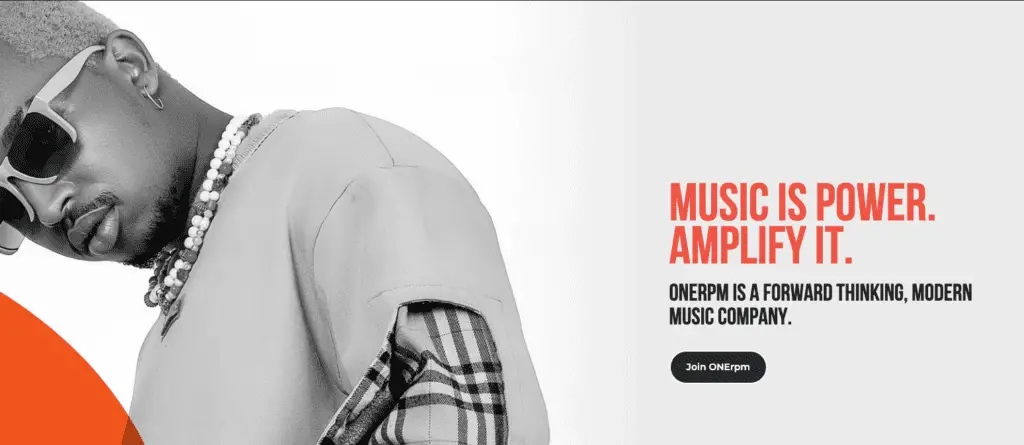
ONErpm is a music company that offers music distribution in addition to music publishing, sync licensing, video management, and several small marketing tools like links and analytics.
Although ONErpm can offer customized and “full service” marketing support, their standard “self-service” features are free to use but take a cut of earnings through commissions.
ONErpm does not seem to be well known or talked about by artists, but apparently has a strong network in Latin America and seems to really focus on providing for artists that are in or releasing music for the Latin American market.
When it comes to music distribution, ONErpm offers unlimited song uploads to most streaming services for free but will take a 15% cut of any earnings your music makes.
Although ONErpm apparently has a reputation for rejecting songs, it is most likely due to standard issues when submitting songs (like incorrect titles, artwork, files, etc) which can happen no matter what distributor you use.
| Pros | Cons |
|---|---|
| No annual fee | They take a massive 15% cut of your earnings |
| Can also provide music publishing, sync licensing, video management, and several small marketing tools like links and analytics | Not well known or talked about by artists |
| Can choose which regions you want to distribute your music to | They take an absolutely massive 15% cut of your earnings |
| The lack of an annual fee and the potential to be a ‘one-stop-shop’ for more than distribution are main benefits | |
| Particularly appealing for artists in or releasing music for the Latin American market |
To learn even more about them, check out this article where I compared DistroKid vs ONErpm. 🙂
9. RouteNote
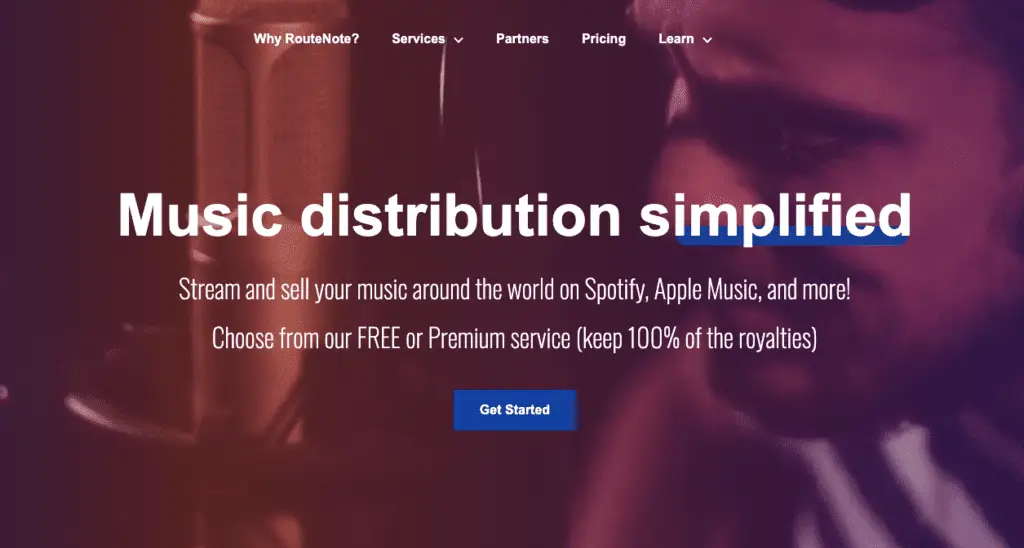
RouteNote.com allows you to upload music to Spotify for free but takes a 15% cut of any song royalties that you may receive.
On top of this, RouteNote does have paid plan versions that are weird and complicated. You pay $30 per year in the first few years and then need to start paying $10 per single and $50 per album.
I’m not too crazy about RouteNote’s offering but they are actually the first music distributor that I used years and years back to put out my first bad songs as Best Friends Club and also some music for my friend Andrew (Tetra).
Solid option if you want to get music up for free and don’t expect get many streams.
10. BoostCollective
BoostCollective is a music distributor and promotion company that allows artists to distribute their music for free, keep 100% of their earnings, and promote their music with video creators, cover art creators, playlist promotion, and more.
It’s possible to distribute and promote your music free using BoostCollective since you can earn credits for anything they offer by releasing more and more music.
Alternatively, you can pay for any of the promotion services and tools they offer if you’d like to get quicker (or more) access.
Their platform is definitely newer and still working through some minor improvements, but they are definitely worth checking out since you can get so much for so little.
11. UnitedMasters
UnitedMasters is not really a music distributor I can recommend since they cost more than the higher-ranked distributors on this list without really justifying that cost.
Although they do have a “free” option, they take 10% of your streaming money and give you very limited features if you go this route.
In particular, they actually have a weird limit on song uploads if you use their free plan (which is particularly awful because releasing music frequently is how I landed my music on 7+ Spotify editorial playlists and got over 300,000 streams).
With that said, they do have a cool-looking “brand” to them and I’ve noticed that the people that do use them seem to be pretty happy with them so it can definitely be worth checking out.
To learn more about them, check out my article where I compare DistroKid Vs. UnitedMasters.
12. TuneCore Classic
To put it simply:
TuneCore’s classic pricing and plans are far too expensive at $9.99 per single or $29.99 per album, every year.
The “pay-per-release” pricing model is dated and is awful for artists trying to make it in 2022 since it encourages you to release music due to how expensive it is to release music this way.
Thankfully, you can now choose to use TuneCore’s new unlimited pricing (which I would highly recommend over their traditional pricing).
| Pros | Cons |
|---|---|
| They have one of the best reputations around in the music distribution space | You have to pay a fee per song or album, not once but every single year |
| A lot of additional features or extras that other music distributors offer are built right in with TuneCore | They are very expensive to use |
| TuneCore is able to take care of music publishing for you (for an additional fee, but still) | |
| TuneCore is able to potentially get sync placements for you (for an additional fee, but still) |
To learn more about Tunecore’s classic pricing model and plans, check out my full article called DistroKid vs Tunecore.
13. Repost By SoundCloud
From all my research on music distributors, I think my least favorite is likely to be Repost by SoundCloud.
With that said, they still do make this list since they can be a great value choice for any artist that uses SoundCloud heavily and is already paying for any of the other SoundCloud subscriptions.
Repost by Soundcloud offers 3 main features:
- The ability to distribute music to music services like Spotify, Apple Music, TikTok, and Instagram
- The ability to monetize your music on Soundcloud (similar to YouTube monetization)
- The ability to promote your music by submitting your music for playlist consideration and building pre-save pages
From researching this topic, I found people in forums literally laughing at what Soundcloud is offering…
One person essentially called Repost by Soundcloud “DistroKid but worse and more expensive”.
It all comes down to 3 main reasons:
- It’s more expensive per year than DistroKid
- They take a 20% cut of your Spotify royalties whereas DistroKid takes 0%
- Soundcloud music distribution quality is new and untested
At the end of the day, the only artists I would recommend Repost by Soundcloud to are those that are already on the SoundCloud Pro Unlimited, since they get the $30 per year fee waived.
To learn more about them, check out this article called Can Distrokid Distribute To SoundCloud?
